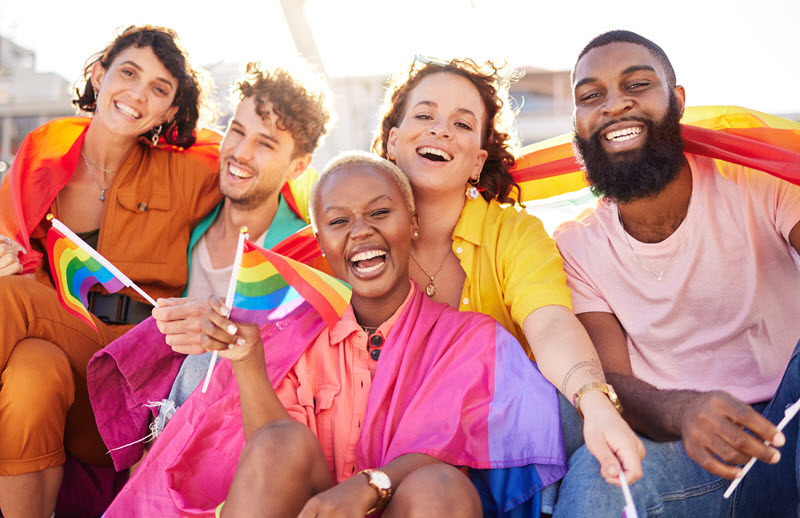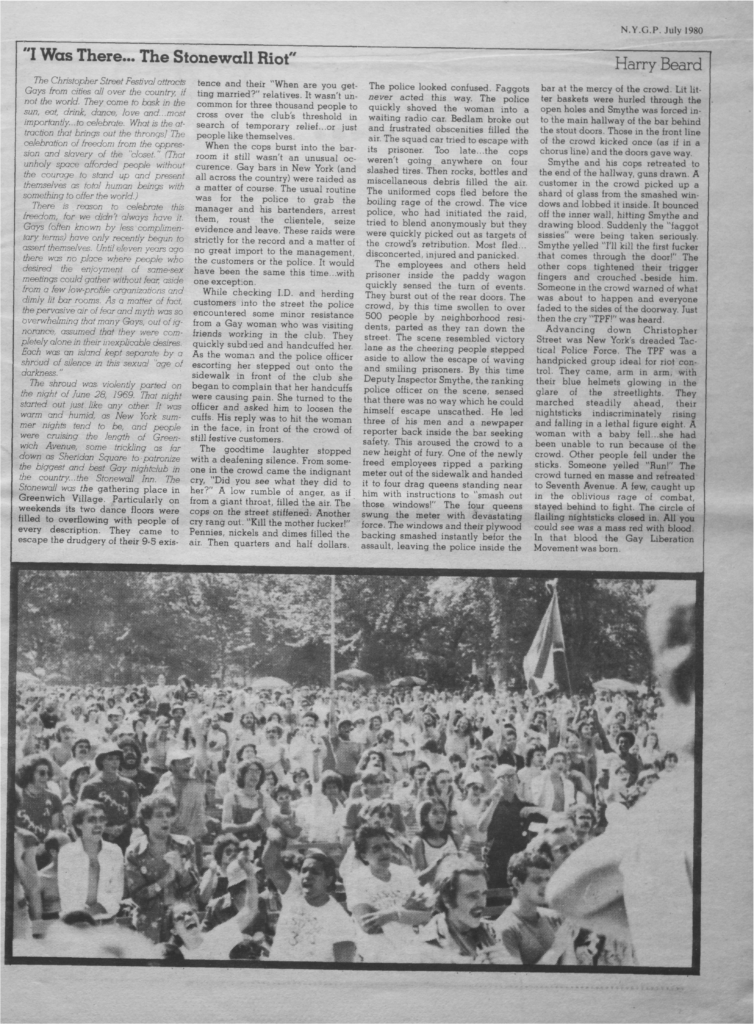| By Gale Staff |
This October, transform your college library into a positive space for sharing information about LGBTQ+ heroes and their stories. LGBTQ+ History Month highlights the historical achievements of LGBTQ+ people and serves as a call to action for equal rights and social justice reforms. While sharing many of its values and goals with June’s Pride Month, LGBTQ+ History Month is an opportunity to reflect on the past and advocate for continued progress.
October marks a remarkable period for the LGBTQ+ community. October 11 is National Coming Out Day and the anniversary of the 1979 march on Washington to champion gay rights. The month also features Spirit Day on October 20, an annual observation to fight LGBTQ+ bullying and violence. As the academic year unfolds, college librarians can honor and raise awareness for LGBTQ+ history, expanding your campus’s ongoing initiatives for acceptance and inclusivity.
To get started, academic staff can leverage Gale’s Archives of Sexuality and Gender series, featuring thousands of unique, historical primary sources highlighting social, political, and legal issues that affect the LGBTQ+ community. User-friendly and diverse, this singular digital anthology is curated by leading sexuality and gender studies scholars. This valuable content is available to all patrons pursuing related research, and librarians can confidently use the information housed in these collections to craft themed displays and outreach materials in honor of LGBTQ+ History Month.
Create a Timeline of Notable Events
There are many creative ways to recognize LGBTQ+ activists and their accomplishments. Many individuals take to social media platforms to share powerful stories of resilience and progress within the community. However, to create a foundation and outline how LGBTQ+ rights have evolved over the past century, you might first construct a timeline of important events to share within your library.
Part One of the LGBTQ+ History and Culture collection presents significant facets of LGBTQ+ culture throughout the mid-to-late 20th century. While primary sources share the common thread of the LGBTQ+ experience, the narratives feature voices from different ethnicities, ages, religions, and political beliefs.
Begin your timeline with the Mattachine Society, the first enduring gay rights organization. Founded in 1950 in Los Angeles, this initially secret organization became a pillar for LGBTQ+ activism, with chapters across the United States, many publishing their own regional newsletters. Explore The Mattachine Society of New York Records, 1951-1976, a collection of more than 20,000 manuscripts, meeting notes, and photographs from the organization’s New York City branch.
From there, dive into the story of the 1969 Stonewall Uprising, six days of civil unrest in Greenwich Village, New York. Following a police raid of the Stonewall Inn, patrons and LGBTQ+ allies fought back against the city’s unjust laws and bigotry. This act of resistance helped inspire the LGBTQ+ movement around the world. Find primary sources from the LGBTQ+ Newspapers and Periodicals Collection, including an actual account from Harry Beard, a journalist who witnessed the vital moment in LGBTQ+ history.
Pivot into the 1980s and raise awareness for the AIDS crisis and its devastating impact on the LGBTQ+ community. Studies in Global Crisis: The International AIDS/HIV Crisis, Part 1: 1985-1999 houses documents related to the medical, economic, and political international response to the HIV/AIDS epidemic. Discover everything from CDC reports to United Nations op-eds to governmental studies from the period.
Enrich Research with In-Depth Perspectives
Part Two of the collection covers the same historical period as its counterpart, but this anthology emphasizes the perspectives from underrepresented communities within the LGBTQ+ community. Such diversity of materials enables patrons to study the complex relationships and viewpoints behind the Gay Rights movement.
Introduce records demonstrating LGBTQ+ customs within indigenous populations. Founded in 1975, Gay American Indians (GAI) was a pioneering group dedicated to gay members of the Native American community. Through the Will Roscoe Papers and Gay American Indians Records, users can find interview transcripts from group leaders and notes from actual meetings.
Explore documents from Great Britain’s Lesbian and Gay Christian Movement collection, housing manuscripts from the later 20th century. Records illustrate how this religious group supported gay and lesbian Christians and fought discrimination within the church. Discover resources and reactions related to a 1990s student guide for navigating the relationship between homosexuality and Christianity.
Today’s researchers will undoubtedly make critical connections to the modern-day LGBTQ+ movement. The secretive early days of 20th-century activism and the boisterous Pride parades of today share some surprising parallels. Encourage students to recognize the past’s valuable lessons and accomplishments but understand that the fight for equal rights is ongoing.
Integrate More Ways to Celebrate
In addition to sharing a timeline of LGBTQ+ history, campus librarians can develop other creative approaches to celebrate the theme throughout October.
Highlight a Different Hero Each Day
Take to social media and share a different LGBTQ+ story each day throughout October. Identify 31 LGBTQ+ figures and promote their work and message across your library’s platforms. Get creative and select individuals from different periods, backgrounds, and industries. Start with Harvey Milk!
Build an LGBTQ+ Book Collection
Select titles to display from prominent LGBTQ+ literary figures. There are many incredible works from authors like Truman Capote, Oscar Wilde, Hans Christian Anderson, Bell Hooks, James Merrill, and Walt Whitman. You could even facilitate a month-long book club featuring an LGBTQ+ writer.
Include Student Leaders
Invite your student-led LGBTQ+ groups to help your library plan events for LGBTQ History Month. Encourage them to share what they want to see within the library space. Plan a mixer, host an LGBTQ+ community member or alum speaker, or develop other targeted events to support your LGBTQ+ students and allies.
This fall, raise awareness for the history and champions behind LGBTQ+ rights. Avoid misinformation and bias by relying on Gale’s Archives of Sexuality and Gender. This extensive, trusted collection of peer-reviewed resources will not only inform your patrons of critical historical events but can spark modern-day activism and continued support for equal rights.
If your academic institution does not subscribe to Gale’s Archives of Sexuality and Gender, you can learn more and even request a trial by visiting our website. For more information on past LGBTQ+ History Month icons and additional ways to recognize this holiday, visit the Equality Forum’s official page.


